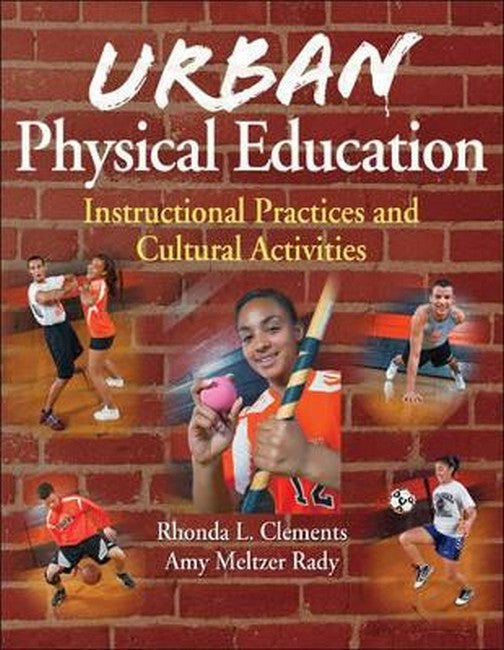Rhonda L. Clements, EdD, is a professor and the director of the master of arts in teaching (MAT) in physical education and sport pedagogy graduate program at Manhattanville College in Purchase, New York, where she conducts research and teaches about historical and sociocultural issues in sport and physical education. Clements is the author of nine books on movement, play, and games. She is past president of the American Association for the Child's Right to Play, a UN-recognized association composed of experts in play, games, and sports in 49 countries. The association's primary purpose is to protect, preserve, and promote play and leisure activities throughout the world. Clements has written numerous articles related to physical education, including 20 on sport and play factors. She is also a consultant for numerous manufacturers of sport equipment and toys and has been interviewed by more than 300 journalists regarding children's right to leisure and physical play. She has presented at 40 international or national conferences and over 60 state or local conferences on topics related to cultural understanding through play and sport. Clements lives in New York City. Amy Meltzer Rady, EdD, is an associate professor and the director of the Physical Education Teacher Preparation program at Saint Joseph's College in Standish, Maine where she is responsible for teaching, advising, and developing courses for the students majoring in physical education. Rady was also instrumental in developing the new Health and Wellness Major at the college and has taught several of the Health courses in this curriculum. Rady has written several articles focusing on attitudes towards physical education and activity. She is beginning international research with professional colleagues in Brazil, China, England, Israel, and the Philippines. Rady taught at William Paterson University in the Physical Education Teacher Education Program before moving to Maine. She has extensive experience teaching physical education basic instructional classes at Barnard College of Columbia University in New York and at the SUNY at Stony Brook. She has taught physical education in public and private schools. Rady has presented at the National Association of Kinesiology and Physical Education in Higher Education Conference: the Eastern District Association of American Alliance for Health, Physical Education, Recreation and Dance, the Maine Association for Health, Physical Education, Recreation, and Dance, the New Jersey Association for Health, Physical Education, Recreation, and Dance, and the American Association for Health, Physical Education, Recreation, and Dance (now SHAPE). Her presentations focus on multicultural activities and professional preparation programs. Rady has recently acquired her Bokwa Level 1 Teacher Certification. Rady lives in Maine. Both authors are longtime member of AAHPERD (now SHAPE) and their state and local physical education associations, and both serve on the National Association for Sport and Physical Education (NASPE) Diversity and Inclusiveness Task Force.
Request Academic Copy
Please copy the ISBN for submitting review copy form
Description
Part One: Considerations for Physical Education Teachers in Urban Settings Chapter 1. Culturally Responsive Teaching Practices Practice 1: Recognize Cultural Characteristics Reflecting Race and Ethnicity Practice 2: Become Acquainted with the Students' Native Countries Practice 3: Recognize Intercultural Differences in Gestures and Body Language Practice 4: Address the Needs of English Language Learners Practice 5: Use Nondiscriminatory Selection Techniques, International Skill Practice Formations, and Urban Ways to Start a Game Practice 6: Enhance the Learning Environment with Themed Bulletin Boards and Greetings Summary Chapter 2. Urban Physical Education Teachers as Leaders Examining One's Teaching Demeanor Responding to Life Skills Questions Responding to Behaviors with PRIDE Common Trigger Scenarios Gangs in Urban Schools Protocols for Teaching Large Classes Summary Part Two: Physical Education Activities for Urban Settings Chapter 3. Culturally Diverse Activities and Challenges African Bolo Ball Egyptian Group Bowling Fives El Circulo Handball Scottish Clock Golf Chinese Soccer Italian Fence or Palificata Four Goals Futbal Four-Team Rip Flag Challenge Modified English Rounders Finnish Baseball or Pesapallo Modified German Fistball Culturally Diverse Cooperative Challenges Culturally Diverse Stretching and Exercise Challenges Culturally Diverse Fitness Challenges Culturally Diverse Race Challenges Japanese Group Fitness Challenges Japanese Team Rock, Paper, Scissors Chapter 4. Physical Activities of Special Interest to Urban Settings Freestyle Basketball Ball-Handling Skills Street Basketball Tricks Pickup Basketball Hotshot Hoops Urban Freestyle Soccer Skills Urban Soccer Urban Golf Modified Ultimate Frisbee Urban Workout Inner-City Workout: Beat Down Parkour Ace, King, Queen, or Jack One-Wall Handball Ultimate Gaga Blister Square Four Stickball Three-Team Softball Ultimate Keep Away The Harlem Shake Krumping Chapter 5. Assessing Diversity Outcomes Sample Rubric 1: Preparing Physical Education Candidates to Teach in Diverse Settings Sample Rubric 2: Assessing Individual Interaction With a Partner or Peer Sample Rubric 3: Assessing a Student's Group Interactive Skills Sample Rubric 4: Assessing the Extent to Which Objectives Have Been Achieved in a Class

